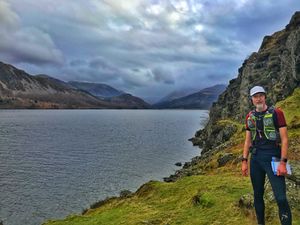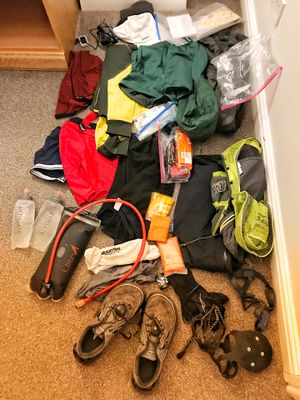Self Supported Runs
While taking part in ultramarathons is a great experience, I've found that self-supported ultra-distance runs are a worthy alternative. Sometimes, I've just found a trail I like, but other times I replicated a race course. A self-supported run has pros and cons that need to be considered. This approach allows you to run a race course for a race that may be difficult to get into, or to experience the race course at a different time of year. There are no time cutoffs, and no rules to follow, which can make things a lot easier. While there is not the companionship of an organized race, there's a much greater sense of freedom in simply running on your own. You may also have a lot more flexibility to choose the right day, avoiding bad weather. You also get to run some amazing trails that may not have an organized race. The biggest downside is that your self-supported, so there is no aid stations to restock, so you have to carry everything you need unless there are facilities for restocking on the way, or you have some friends to act as crew. In fact, you needed to carry far more than you will actually need, as you don't have the safety net of an organized race and other runners. The risk of a self-supported ultra distance run should not be underestimated! There's also the logistical difficulty of getting to and from the trail if it's a point to point course.
Equipment
I ran the first 40 miles of Wainwrights Coast To Coast, and noted my equipment. I carried enough gear that I could spend a night on the fells, though not in any kind of comfort. My gear list was:
- Running Pack. I used the Ultimate Direction Hardrocker for it's capacity. It's hard to find a pack that will carry enough gear and still be good for running.
- I had two 500ml water bottles plus a bladder with 1.5 liters of de-fizzed coke. I de-fizzed by adding salt, which also provides some electrolytes. I ran in winter, so my hydration needs were limited, and there were resupply stops along the route.
- I had a lot of Merino wool clothing, including a couple of great hoodies. The thinner Icebreaker Winter Zone Hoodie] and the thicker Icebreaker Ellipse LS Hoodie gives me lots of warmth for little weight.
- The Ultimate Direction Ultra Jacket is an amazingly good waterproof jacket. It's incredibly light, and waterproof to 30,000mm of water, which is better than most heavyweight waterproofs. It's got lots of nice features that show it was designed and tested by someone that actually runs ultras. I also carried rain trousers. The purpose of the waterproofs is not to keep me dry, as that's pretty much impossible will your running. Rather, they are to keep me warm in a storm. A torrential downpour can rapidly create hypothermia; I experienced that in the North Carolina mountains on a hot summers day. Just because it's 90f/35c doesn't mean you can't get hypothermia!
- My base layers were icebreaker briefs, XOSKIN top, Race Ready tights, and compression boxers (which I've come to love.)
- My halo hat keeps the sun and rain out of my eyes.
- A merino wool hat and convertible mittens allow for easier temperature control. I can take them off or put them on while running, and without taking the pack off.
- I used merino Injinji Liner Crew NuWool Socks with Wrightsock Silver dual layer socks over the top.
- I wore the Altra Timp trail shoe, which worked well for the conditions.
- I carried a large foil blanket for emergencies. It's big enough to provide a fair shelter, not just wrap around.
- I carry my Portable Pharmacy with medications, my music player for motivation.
- The Black Diamond Sprinter saved my bacon when I ended up finishing after dark.
- I had traction aids with me, but ended up not taking them as there was no snow at the altitude I ran at.
- I wish I'd had a personal locator beacon like the Garmin InReach.

